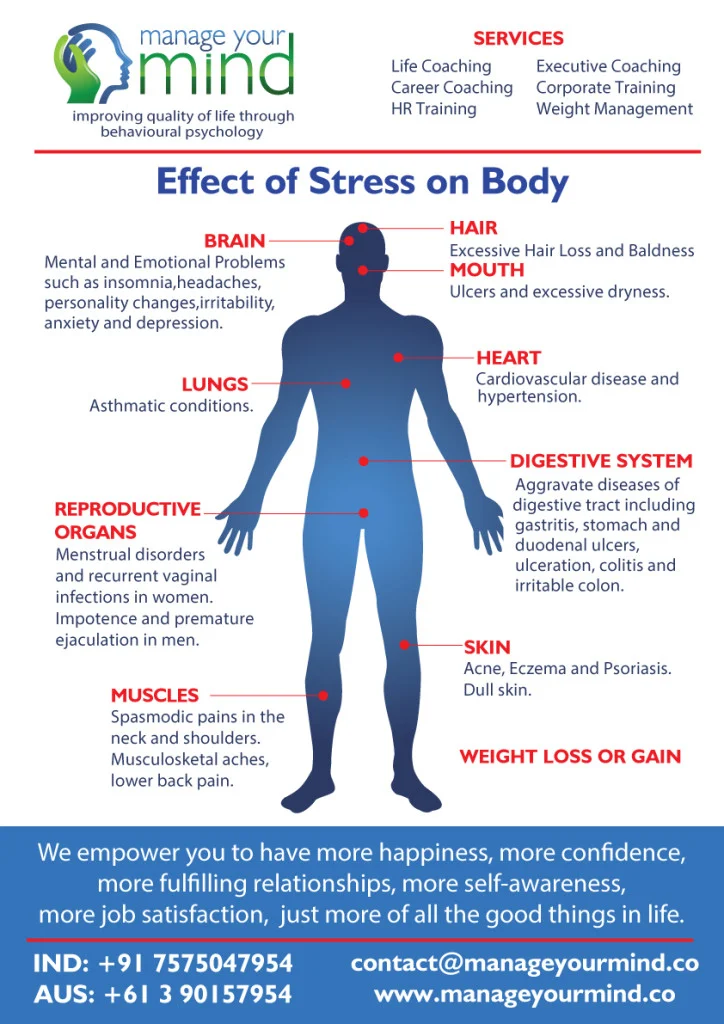Stress has a significant impact on physical health, leading to a range of negative outcomes such as increased blood pressure, weakened immune system, and heightened risk of heart disease. Furthermore, chronic stress can also contribute to the development of conditions such as anxiety, depression, and insomnia. It is crucial to recognize the signs of stress and implement effective strategies to manage it in order to maintain overall well-being. Various techniques such as regular exercise, mindfulness meditation, and seeking support from friends and family can be beneficial in reducing the impact of stress on physical health.
The effects of stress on the body can manifest in various ways, including muscle tension, headaches, and digestive issues. Additionally, the release of stress hormones such as cortisol can disrupt the body’s natural balance, leading to weight gain and increased inflammation. In order to mitigate these effects, individuals can explore alternative methods of stress management such as aromatherapy, acupuncture, and engaging in hobbies or activities that bring joy and relaxation. By taking proactive steps to address stress, individuals can improve their physical health and overall quality of life.
The Impact of Stress on Physical Health
Stress has a significant impact on physical health, leading to a wide range of symptoms and health problems. When the body experiences stress, it goes into “fight or flight” mode, releasing hormones like adrenaline and cortisol. While this response is helpful in short bursts, chronic stress can lead to prolonged activation of these stress hormones, which can have detrimental effects on the body.
Chronic stress has been linked to an increased risk of developing various health conditions, including high blood pressure, heart disease, obesity, diabetes, and weakened immune function. Additionally, stress can lead to unhealthy coping behaviors such as overeating, substance abuse, and lack of physical activity, further contributing to poor physical health.
How to Manage Stress for Better Physical Health
There are various strategies that can help manage stress and reduce its impact on physical health. Regular physical activity has been shown to be an effective way to reduce stress levels and improve overall physical health. Engaging in activities such as yoga, meditation, and deep breathing exercises can also help calm the mind and reduce the body’s stress response.
Building a strong support system and seeking social connections can provide emotional support and help individuals manage and cope with stress more effectively. Additionally, practicing good time management, setting realistic goals, and prioritizing tasks can help reduce feelings of being overwhelmed and stressed. Seeking professional help from therapists or counselors can also provide valuable tools and techniques for managing stress and improving physical health.
The Role of Nutrition in Managing Stress
Nutrition plays a crucial role in managing stress and supporting physical health. Consuming a balanced diet that includes a variety of fruits, vegetables, whole grains, lean proteins, and healthy fats can provide the body with essential nutrients that support overall well-being and resilience to stress. Additionally, certain nutrients such as omega-3 fatty acids, magnesium, and vitamin C have been shown to have stress-reducing properties.
Avoiding excessive consumption of caffeine, sugar, and processed foods, which can contribute to feelings of anxiety and stress, is also important for managing stress through nutrition. Staying hydrated and consuming adequate water throughout the day is essential for supporting the body’s stress response and overall physical health.
The Importance of Adequate Sleep in Managing Stress
Adequate sleep is crucial for managing stress and supporting physical health. Chronic stress can disrupt sleep patterns and lead to insomnia, which in turn can further exacerbate stress levels and impact overall well-being. Establishing a consistent sleep routine, creating a relaxing bedtime environment, and practicing relaxation techniques before bed can help improve sleep quality and reduce the impact of stress on the body.
Getting the recommended 7-9 hours of sleep per night is essential for allowing the body to repair and restore itself, as well as for regulating stress hormones and promoting overall physical health. Prioritizing sleep and making it a non-negotiable part of daily self-care can significantly contribute to better stress management and improved physical well-being.
The Impact of Stress on Digestive Health
Stress can have a profound impact on digestive health, leading to symptoms such as stomach aches, indigestion, bloating, and changes in appetite. When the body is under stress, the digestive system can become compromised, leading to inflammation, imbalances in gut bacteria, and decreased nutrient absorption. Chronic stress has also been linked to an increased risk of developing gastrointestinal disorders such as irritable bowel syndrome (IBS) and inflammatory bowel disease (IBD).
Managing stress through relaxation techniques, regular exercise, and a balanced diet can help support digestive health and reduce the impact of stress on the gastrointestinal system. Additionally, seeking professional help from healthcare providers or nutritionists can provide personalized strategies for managing stress-related digestive issues and improving overall physical health.
The Connection Between Stress and Cardiovascular Health
Chronic stress has a significant impact on cardiovascular health, increasing the risk of developing conditions such as high blood pressure, heart disease, and stroke. Prolonged activation of the body’s stress response can lead to inflammation, constricted blood vessels, and elevated heart rate, all of which can contribute to cardiovascular problems. Additionally, stress can lead to unhealthy behaviors such as overeating, smoking, and excessive alcohol consumption, further increasing the risk of cardiovascular issues.
Managing stress through regular physical activity, stress-reducing techniques, and seeking social support can help mitigate the impact of stress on cardiovascular health. Engaging in activities that promote relaxation, such as yoga, meditation, and spending time in nature, can also help reduce the body’s stress response and support overall cardiovascular well-being.
The Role of Stress in Immune Function and Overall Health
Stress has a profound impact on immune function, with chronic stress being linked to a weakened immune system and increased susceptibility to infections and illness. Prolonged activation of the body’s stress response can lead to imbalances in immune function, making it harder for the body to fight off pathogens and maintain overall health. Additionally, stress-related behaviors such as poor sleep, unhealthy eating habits, and lack of physical activity can further compromise immune function.
Managing stress through various techniques such as mindfulness, relaxation, and seeking social support can help support immune function and overall health. Prioritizing self-care, engaging in activities that bring joy and relaxation, and seeking professional help when needed can also contribute to better stress management and improved immune function.
| Stress Impact | Physical Health | Management |
|---|---|---|
| Increased heart rate | Cardiovascular problems | Regular exercise |
| Suppressed immune system | Increased susceptibility to infections | Healthy diet and proper rest |
| Muscle tension | Chronic pain and headaches | Yoga and meditation |
| Digestive issues | Stomach ulcers and irritable bowel syndrome | Stress management techniques |



